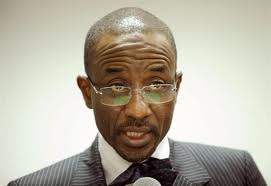Despite criticism by organized labour and opposition by a lot of Nigerians, including state governors, the Governor of the Central Bank of Nigeria, Sanusi Lamido Sanusi, has said he stands by his position that the government must reduce its workforce by not less than 50 per cent.
Sanusi, who spoke with Nigerian journalists on the sidelines of the 13th meeting of the Honorary International Investment Council in London, United Kingdom, said that his position was the painful truth.
He said that occupying the position of the CBN governor does not mean he should not speak the truth.
He said that the position of the CBN governor was not a popularity contest.
Sanusi, at the HIIC meeting, also attended by Vice President Namadi Sambo and some ministers, told newsmen: “Well, the headlines said I advised the Federal Government to sack 50 per cent of workers but headlines are headlines and I can’t do anything with anyone taking what I say.
“If people chose to pick on just one aspect of my speech and make it the issue, I can’t do anything about it.
“You know the Central Bank Governor is not in a popularity contest.
“My job is to give a frank and honest opinion as to where I think the economy will go.
“Sometimes, people will be happy, sometimes they will not.
“People call for my sack, that’s fine but it doesn’t change the reality.
“I mean if you sack me, you appoint the next governor of Central Bank, if he knows his job, he will say the same thing and you can sack him and the next governor will say the same thing.
“In general, we were speaking about the Capital Market and development and my view is that we cannot have a thriving capital market, we cannot have long term economic development until the government starts spending less money on itself and more on the real economy.
“A situation in which 70 per cent of government’s revenue goes to payment of public service workers in some states in the North, obviously they are going to pay monthly salaries, there is no way in that situation you are going to create the economic growth that you require and the government cannot employ all the 167 million Nigerians.
“So, we have a situation in which one million public servants at the local, state and federal levels take 70 per cent of government revenues and 30 per cent is left for 166 million Nigerians for health, education, roads, for power.
“It’s simply not assisting the system.
“Then certainly, I spoke about the need to reduce the size of the public service and I wasn’t necessarily talking about civil servants because you also have political appointees.
“We have 774 local governments.
“Each local government has a chairman and 10 councillors.
“We have 36 states in Nigeria – governors, deputy governors, special advisers, special assistants, state Houses of Assembly and their officials.
“There is one state governor I know that, according to the newspapers, has over 400 special assistants.
“At the federal level, we have the president, the vice president, 500 federal legislators, 43 ministers.
“Now, these are constitutional issues but even if they are, we have a clause that says you must have a minister from every state and what does that mean?
“Do you decide the numbers of ministries at the federal level based on the number of states that you have?
“So, do you really need 43 ministers?
“These are questions that we need to ask.
“It’s an American system for a rich country.
“I am not aware of any African country that has that kind of political system.
“It is very expensive.
“My view and that of every trained economist is that any system that continues to spend all its revenues on salaries can solve short term problems for a small minority but create longer term problems for the rest of the country and that was it.
“You know until we face the reality that you cannot have development without broad-based capital formation.
“Obviously, I didn’t just talk about the workforce.
“Out of the 30 per cent that we spend, we spend a lot of money on fuel we are consuming.
“Why should we subsidize consumption?
“So, you spend on fuel subsidy, you got the quality of government expenditure in general and the direction of government spending, you are not spending enough on education, you are not spending enough on health.
“You are spending money on some infrastructures like airports that might be concessioned and I made all those points.”
Previous ArticleEPL: Chelsea seek first win under Benitez
Next Article Actor Joseph Benjamin quits marriage


